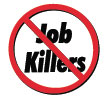California Chamber warns of ‘job killer’ bills

“The economic recovery is still the number one issue for Californians,” said Allan Zaremberg, President and CEO of the California Chamber of Commerce. “These bills pose a serious threat to our economy and, if enacted, would dampen job growth in the state. While it is encouraging that the list of new job killer bills is smaller than in past years, the unfortunate consequence of any one of these bills becoming law would be harmful to our economy. Protection of the job climate remains CalChamber’s top priority.”
Legislation included on the “job killer” list released today will change throughout the year as bills are amended or new language is introduced.
The 2014 “job killer” list
Costly Workplace Mandates
AB 1522 (Gonzalez; D-San Diego) Paid Sick Leave — Increases employer mandates by requiring all employers, large and small, to provide all employees in California with paid sick leave, and threatens employers with statutory penalties as well as litigation for alleged violations.
AB 2604 (Brown; D-San Bernardino) Exposes Employers to Disproportionate Workers Compensation Penalties — Dramatically increases penalties and costs for delayed payments and will result in disproportionate penalty awards that are significantly greater than the amount of the delayed payment.
SB 935 (Leno; D-San Francisco) Minimum Wage — Unfairly increases employer costs by increasing the minimum wage to $13 by 2017 and then increased thereafter according to the Consumer Price Index.
Economic Development Barriers
AB 1897 (Hernández; D-West Covina) Contractor Liability — Unfairly imposes liability on any contracting entity for the contractor’s wage and hour violations, lack of worker’s compensation coverage, and/or failure to remit employee contributions, despite the lack of any evidence that the contracting entity controlled the working conditions or wages of the contractor’s employees.
AB 2140 (Bloom; D-Santa Monica) Harms Economy — Eliminates jobs and chills tourism in the San Diego region by eliminating performances of Orca at SeaWorld San Diego.
AB 2372 (Ammiano; D-San Francisco) Split Roll Change of Ownership — Unfairly targets commercial property by redefining “change of ownership” so that such property is more frequently reassessed, which will ultimately lead to higher property taxes that will be passed onto tenants, consumers, and potentially employees.
AB 2416 (Stone; D-Scotts Valley) Unproven Wage Liens — Creates a dangerous and unfair precedent in the wage and hour arena by allowing employees to file liens on an employer’s real or personal property, or property where work was performed, based upon alleged yet unproven wage claims.
AB 2420 (Nazarian; D-Studio City) Significantly Limits In-State Energy Development — Places California businesses at a disadvantage, increasing fuel costs, impeding job growth and suppressing property, income and excise tax revenues, by allowing local governments to impose local moratoriums on well stimulation treatments.
AB 2617 (Weber; D-San Diego) Interference with Arbitration Agreements and Settlement Agreements — Unfairly prohibits the enforcement of arbitration agreements or pre-litigation settlement agreements that require the individual to waive their right to pursue a civil action for the alleged violation of civil rights.
SB 1017 (Evans; D-Santa Rosa) Oil and Gas Severance Tax — Unfairly targets the oil and gas industry with the burden of a severance tax on the extraction of oil and gas in order to fund higher education, health and human services, as well as the state parks and recreation.
SB 1021 (Wolk; D-Davis) Split Roll — Discriminates against commercial property through split roll by allowing a school district to impose a higher parcel tax against commercial property as opposed to residential property.
SB 1132 (Mitchell; D-Los Angeles) Significantly Limits In-State Energy Development — Imposes a statewide moratorium on well stimulation treatments until the completion of a scientific study, thereby placing California businesses at a disadvantage, increasing fuel costs, impeding job growth and suppressing property, income and excise tax revenues.
SB 1188 (Jackson; D-Santa Barbara) Unwarranted Expansion of Product Defect Litigation — Significantly increases product defect litigation and associated claims by allowing consumers to pursue claims after the warranty has expired for “material” omissions regarding the product that are unrelated to any health and safety concerns.
SB 1372 (DeSaulnier; D-Concord) Increased Tax Rate — Threatens to significantly increase the corporate tax rate on publicly held corporations and financial institutions up to 15% according to the wages paid to employees in the United States, and threatens to increase that rate by 50% thereafter, if the corporation or institution reduces its workforce in the United States and simultaneously increases its contractors.
SB 1381 (Evans; D-Santa Rosa) California-Only New Labeling Requirements and Increased Litigation — Increases cost of food productions and increases frivolous litigation by forcing farmers and food companies to implement costly new labeling, packaging, distribution and recordkeeping for products sold in California and by including a private right of action, increases litigation on all entities in the supply chain if a product was not properly labeled.
2013 job killer carry-over bills
Costly Workplace Mandates
SB 404 (Jackson; D-Santa Barbara) Expansion of Discrimination Litigation — Makes it virtually impossible for employers to manage their employees and exposes them to a higher risk of litigation by expanding the Fair Employment and Housing Act to include a protected classification for any person who is, perceived to be, or associated with an individual who provides medical or supervisory care to a listed family member.
Economic Development Barriers
AB 52 (Gatto; D-Los Angeles) CEQA Consultation with Tribes — Creates new opportunities for CEQA litigation by requiring lead agencies to engage in “meaningful consultation” with Native American tribes regarding land use projects that could have an adverse impact on a tribal cultural resource.
AB 1330 (J. Pérez; D-Los Angeles) New Double Penalties — Discourages investment and expansion in some disadvantaged regions of the state by doubling most fines and penalties issued by the Air Resources Board (ARB), Department of Toxic Substances Control (DTSC) and Air Quality Management Districts (AQMD’s) on facilities located there.
ACA 3 (Campos; D-San Jose) Lowers Vote Requirement for Tax Increases — Adds complexity and uncertainty to the current tax structure and pressure to increase taxes on commercial, industrial and residential property owners by giving local governments new authority to enact special taxes, including parcel taxes, by lowering the vote threshold from two-thirds to fifty-five percent.
ACA 8 (Blumenfield; D-San Fernando Valley) Lowers Vote Requirement for Tax Increases — Adds complexity and uncertainty to the current tax structure and pressure to increase taxes on commercial, industrial and residential property owners to finance local public safety, transportation, water and recreation infrastructure by lowering the vote threshold for bonded debt supported by property taxes from two-thirds to 55%.
SB 686 (Jackson; D-Santa Barbara) Safety Recalls — Exposes car dealers to significant liability and precludes them from renting, leasing, loaning, or selling a car despite the lack of actual knowledge that the car was subject to a recall, that may or may not pose any imminent harm to the consumer or renter.
SB 691 (Hancock; D-Berkeley) Dramatically Increases Pollution Penalties — Dramatically increases existing strict-liability penalties for nuisance-based, non-vehicular air-quality violations without adequately defining what types and levels of pollution would trigger those penalties.
SCA 4 (Liu; D- La Cañada Flintridge) Lowers Vote Requirement for Tax Increases — Adds complexity and uncertainty to the current tax structure and pressure to increase taxes on commercial, industrial and residential property owners by giving local governments new authority to enact special taxes, including parcel taxes, by lowering the vote threshold from two-thirds to fifty-five percent.
SCA 7 (Wolk; D-Davis) Lowers Vote Requirement for Tax Increases — Adds complexity and uncertainty to the current tax structure and pressure to increase taxes on commercial, industrial and residential property owners by giving local governments new authority to enact special taxes, including parcel taxes, by lowering the vote threshold from two-thirds to fifty-five percent.
SCA 8 (Corbett; D-San Leandro) Lowers Vote Requirement for Tax Increases — Adds complexity and uncertainty to the current tax structure and pressure to increase taxes on commercial, industrial and residential property owners by giving local governments new authority to enact special taxes, including parcel taxes, by lowering the vote threshold from two-thirds to fifty-five percent.
SCA 9 (Corbett; D-San Leandro) Lowers Vote Requirement for Tax Increases — Adds complexity and uncertainty to the current tax structure and pressure to increase taxes on commercial, industrial and residential property owners by giving local governments new authority to enact special taxes, including parcel taxes, by lowering the vote threshold from two-thirds to fifty-five percent.
SCA 11 (Hancock; D-Oakland) Lowers Vote Requirement for Tax Increases — Adds complexity and uncertainty to the current tax structure and pressure to increase taxes on commercial, industrial and residential property owners by giving local governments new authority to enact special taxes, including parcel taxes, by lowering the vote threshold from two-thirds to fifty-five percent.




















